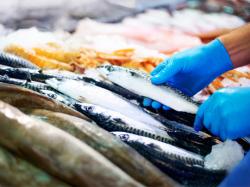New Study Reveals Significant Amount Of Illegal Seafood Enters US
April 8, 2014 | 2 min to read

WASHINGTON- A groundbreaking new study to be published in Marine Policy estimates that between 20-32 percent of wild-caught seafood imported into the U.S. comes from illegal, unregulated and unreported (IUU) or “pirate” fishing. Valuing at $1-2 billion annually, this represents between 15-26 percent of the total value of wild-caught seafood imported into the U.S.
Pirate fishers commonly ignore domestic and international fishing laws, regulations and policies by fishing in closed areas or during prohibited times, often catching threatened species, and using illegal gear. The new study finds that the amount of illegally caught seafood entering the U.S. market is in line with global estimates of pirate fishing, assessed at 13-31 percent of global catch and valued at between $10-23.5 billion each year.
Oceana ocean advocate Beckie Zisser issued the following statement on the study’s findings:
“This study unfortunately confirms what we have long suspected – that seafood from pirate fishing is getting into our markets. Illegal fishing undercuts honest fishermen and seafood businesses that play by the rules, and the U.S. should not be incentivizing pirate fishers by creating a legal market for their products.
The solution to this problem is requiring proof of legality and traceability as a condition to import into the U.S., ensuring that all seafood sold in the U.S. is safe, legally caught and honestly labeled. Before seafood crosses our borders and enters our markets, it needs to have documentation that verifies that it was legally caught, and that the fish traveled a transparent path from the fishing vessel to our dinner plates.
As the U.S. is one of the largest importers of wild-caught seafood, the federal government has a responsibility to cut off the financial incentives for pirates by keeping illegal product out of our markets. The federal government can and must use its existing authority to shut our borders to illegally caught seafood and level the playing field for honest fishermen and seafood businesses.
Congress must also pass the Safety and Fraud Enforcement for Seafood Act (SAFE Seafood Act), a bill that would require traceability throughout the seafood supply chain, improve inspections and provide more information to consumers at the point of purchase. Without traceability, U.S consumers are inadvertently funding the profits of illegal fishing. We need to track our seafood from boat to plate to protect the oceans, consumers and public health.”
For more information on Oceana’s campaign to stop seafood fraud, click here.
Oceana is the largest international advocacy group working solely to protect the world’s oceans. Oceana wins policy victories for the oceans using science-based campaigns. Since 2001, we have protected over 1.2 million square miles of ocean and innumerable sea turtles, sharks, dolphins and other sea creatures. More than 600,000 supporters have already joined Oceana. Global in scope, Oceana has offices in North, South and Central America and Europe. To learn more, please visit www.oceana.org.
Source: Oceana
